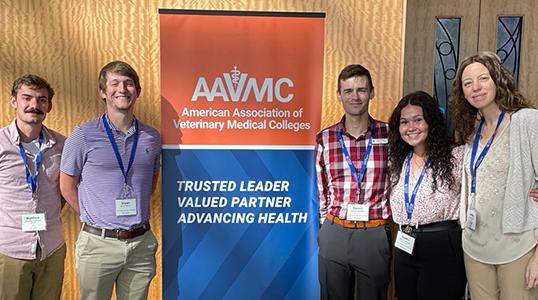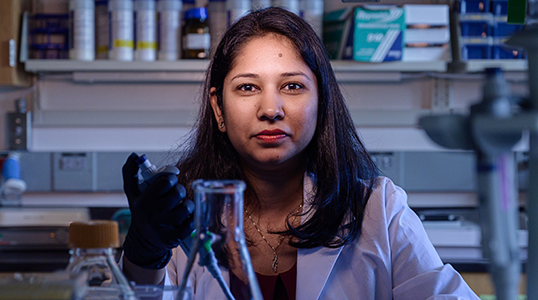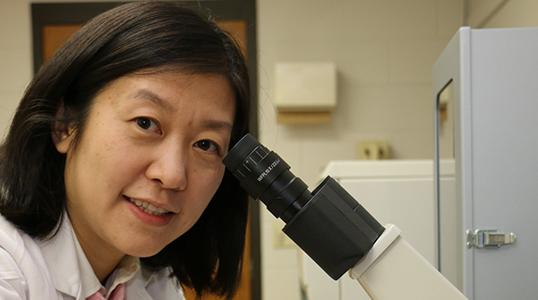Individual Training Grants
![]()
Scientists experienced in veterinary medicine contribute important expertise to animal, molecular, and genomic studies leading to translational research that benefits human health. ORIP's Division of Comparative Medicine (DCM) offers career development support for individuals with D.V.M. or Ph.D. degrees, as well as predoctoral veterinary students.
ORIP career development programs are described below. Prospective applicants are advised to review these descriptions and, if interested, to obtain further information from the following sources:
- The relevant notice of funding opportunity (NOFO) originally published in the NIH Guide
- The relevant Program Guidelines
Applications should be relevant to a specific, funded program. It is strongly recommended that applicants contact the Scientific Program Contact identified within the NOFO (listed under Program Contacts) before preparing or submitting an application.
NIH also offers Career Development K Awards. For more information, visit the NIH K Kiosk.
Predoctoral Veterinary Students
Veterinary students wishing to gain research experience should check to see if their institution has an existing Summer T35 Training Program.
Individuals with D.V.M. Degrees
Depending on the level of experience at the time of application, and the desired outcome, veterinarians may be interested in K01 or K99/R00 grants:
Special Emphasis Research Career Award (SERCA) in Pathology and Comparative Medicine (K01)
Supports graduate veterinarians with research experience to become independent biomedical investigators. Read the SERCA Guidelines.
Early Stage Investigators Using Nonhuman Primate Research Models: K01 (Limited to veterinarian scientists)
The Early Stage Investigators Using Nonhuman Primate Research Models (ESI-NHP) K01 provides early-stage investigators (within 10 years of completing a terminal professional degree or residency training) with support and “protected time” (up to 5 years) for intensive, research-focused career development program activities under the guidance of an experienced mentorship team with expertise in both the preclinical application of nonhuman primate (NHP) models and in translation of the results from such studies to clinical application. The focus of this program is to increase the number of highly skilled scientists using NHP models to address complex translational biomedical research designed to foster translation of outcomes into the clinic. The expectation is that through this sustained period of research career development and training, awardees will launch independent research careers and become competitive for new research project grant (e.g., R01) funding. ORIP will contribute up to $75,000 per year toward the salary of the career award recipient. ORIP will contribute $100,000 per year toward the research development costs of the award recipient. For information about ORIP’s participation in this ESI-NHP K01 announcement, visit https://grants.nih.gov/grants/guide/pa-files/PAR-23-073.html.
Individuals with D.V.M. or Ph.D. Degrees
HIV/AIDS Scholars Using Nonhuman Primate (NHP) Models (K01)
The HIV/AIDS Scholars K01 provides early-stage investigators (within 10 years of completing a terminal professional degree or residency training) with 3 years of mentored career development to prepare for independent research careers using nonhuman primates (NHPs) as preclinical models for HIV/AIDS. The high cost and time required to perform NHP studies make it challenging for junior investigators to transition to independent positions. HIV/AIDS Scholars receive salary and research support and guidance from an experienced mentorship team, with expertise in both the preclinical application of NHP HIV/AIDS models and in translation of the results from such studies to clinical application in humans. By enhancing critical aspects of career development such as grantsmanship, networking, and the ability to translate results from animals to the clinic, awardees prepare to launch independent research careers and become competitive for new research project grant funding (e.g., R01). The program brings participants together annually for the Conference for Early Stage HIV/AIDS Researchers using Nonhuman Primate Models. For information about ORIP’s participation in this HIV/AIDS Scholars Using Nonhuman Primate (NHP) Models K01 announcement, visit https://grants.nih.gov/grants/guide/pa-files/PAR-23-225.html.






